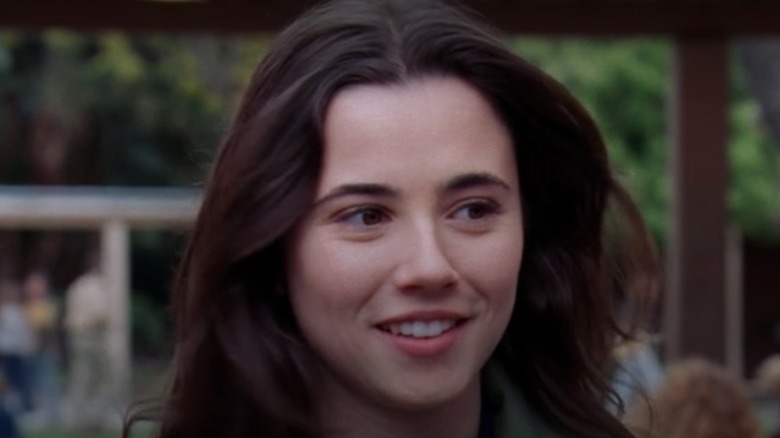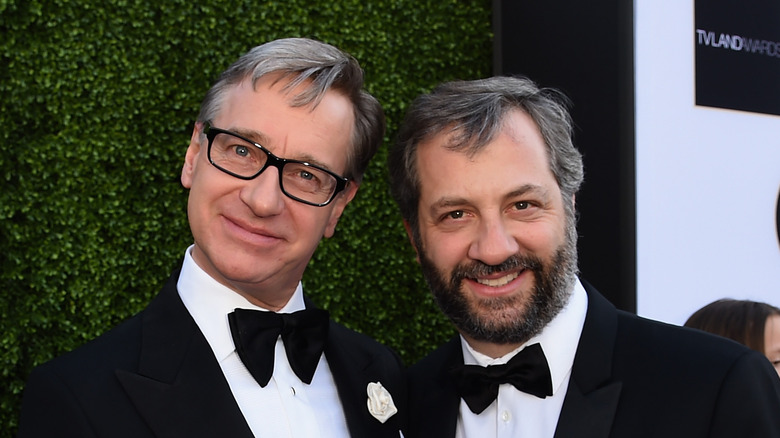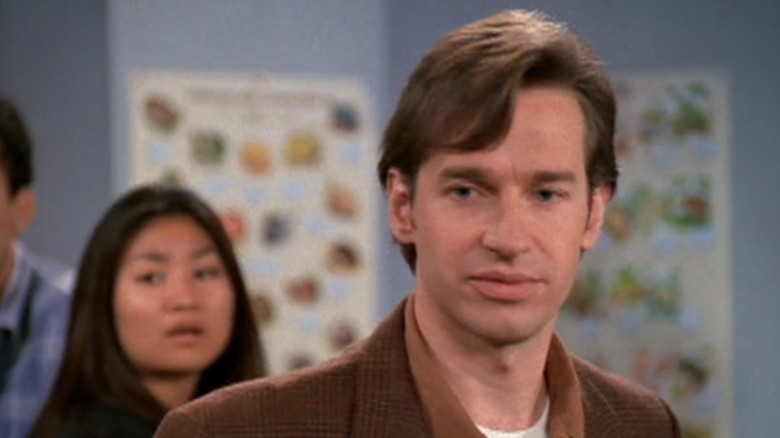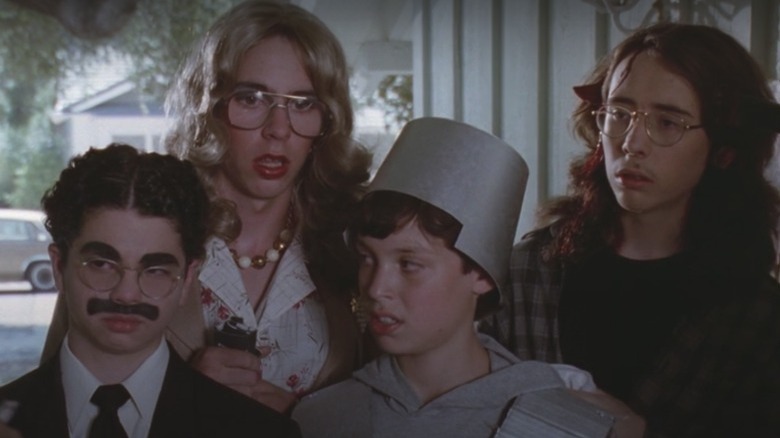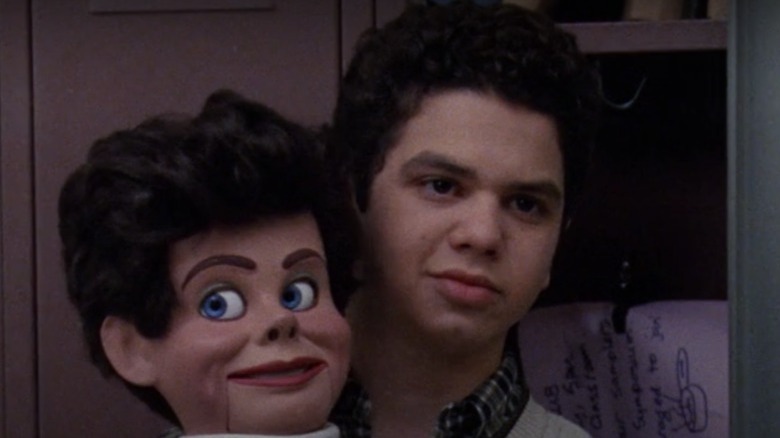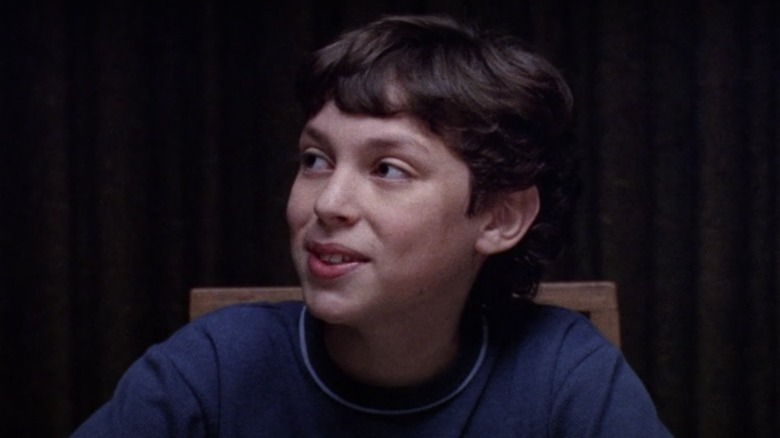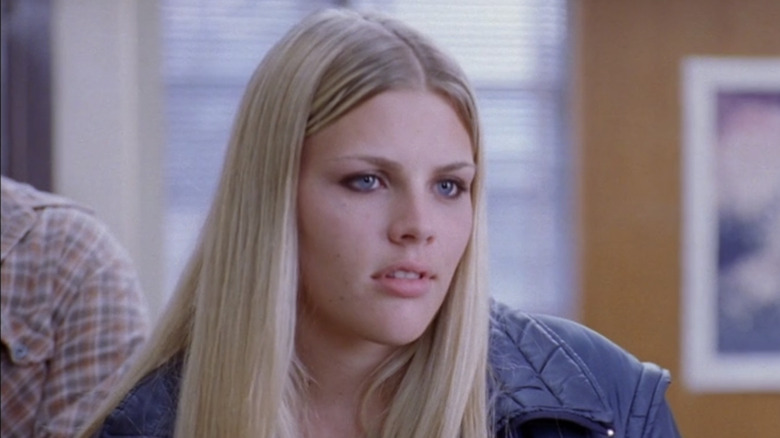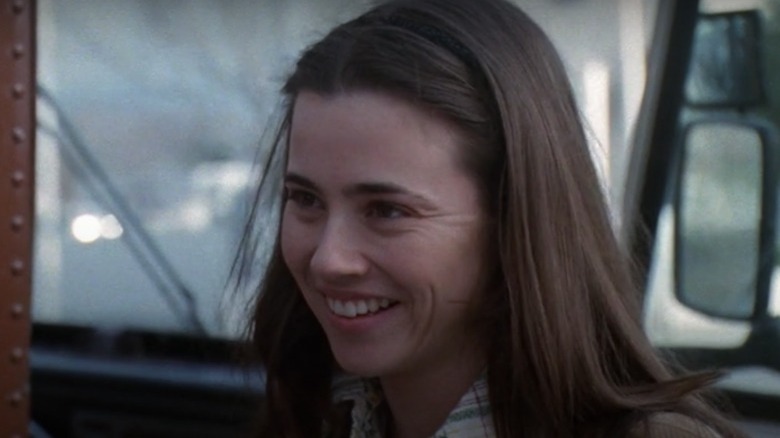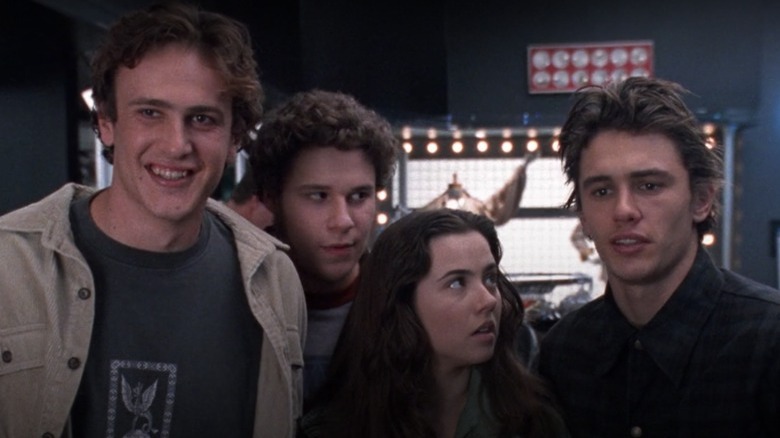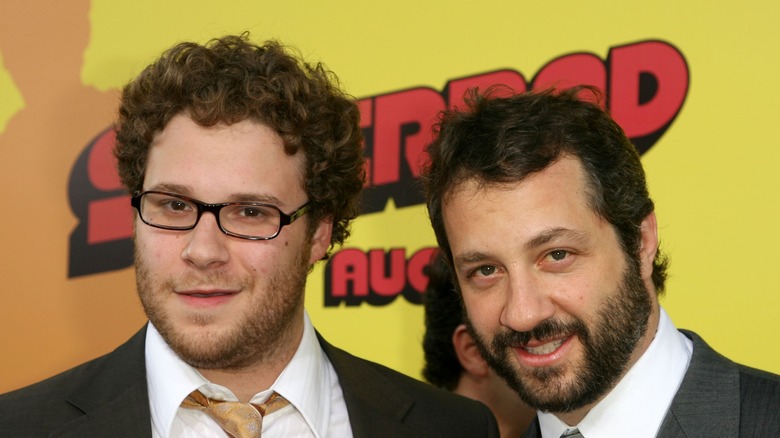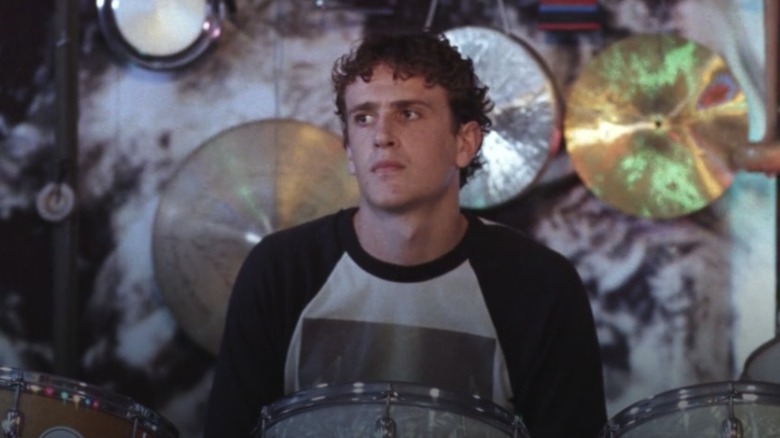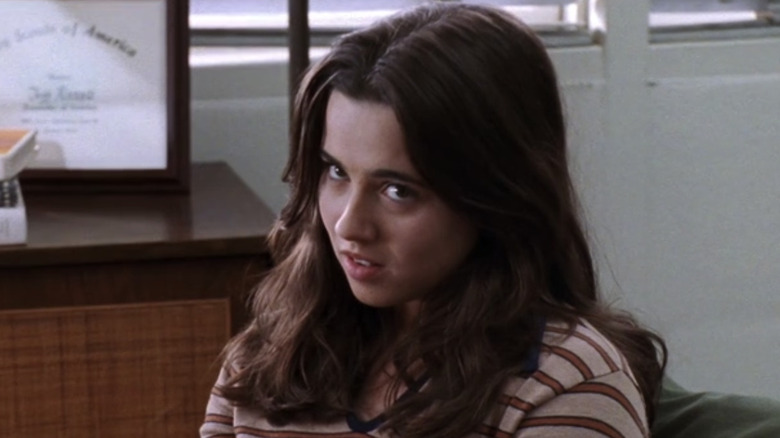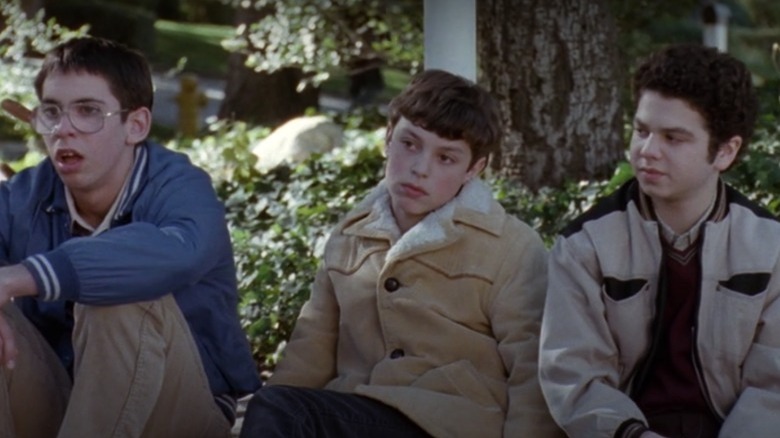The Untold Truth Of Freaks And Geeks
"Freaks and Geeks," created by Paul Feig and executive produced by Judd Apatow, has become a TV cult classic with a devoted fan base. Although it struggled to find a wide audience upon its initial release in 1999 and was canceled after just one season, many see this short-lived show as a cultural touchstone decades after its original run. In response to the countless trite depictions of high school life, which focused on unrealistically attractive kids involved in implausibly adult situations, Feig and Apatow made it their mission to honestly portray the real adolescent travails and insecurities of a set of decidedly uncool, zits-and-all kids in 1980 suburban Michigan.
As Martin Starr, who portrayed archetypal geek Bill Haverchuck, puts it, "I see the value in what we created with 'Freaks and Geeks' because it was so heartfelt and so pure in its core ... they're all very earnest stories and the fact that they resonate with people doesn't surprise me" (via YouTube). Plus, Feig absolutely nails the show's carefully curated soundtrack that features hits from Van Halen to The Who to Rush. And he deftly interweaves these songs that teens of this era would have been blasting in their beat-up Gremlins on the way to a Pink Floyd laser show. So, put your pencils down, grab a hall pass, and get ready to explore the untold truth of the beloved show, "Freaks and Geeks."
Paul Feig and Judd Apatow were old friends
Before working together on "Freaks and Geeks," creator Paul Feig and executive producer Judd Apatow had a long-standing friendship. Feig and Apatow first met each other in the 1980s Los Angeles comedy scene. At that time, Feig was an aspiring actor making guest appearances on television shows like "The Facts of Life," "Newhart," and "Thirtysomething." Meanwhile, Apatow was a teenager, who "wanted to be in the comedy world so bad that there was nothing [he] wouldn't do to get access to comedians" and in fact, he interviewed comedians for his high school radio show (via NPR). According to an oral history of "Freaks and Geeks" in Vanity Fair, Feig and Apatow first met at "the Ranch," a house in California where aspiring Midwestern comics hung out.
Feig and Apatow stayed connected as their careers evolved. In 1995, Feig acted in "Heavyweights," which was the first feature film that Apatow wrote. When Feig later started transitioning from acting to a writing career, he bumped into Apatow, who asked if he had any ideas for a television show. Apatow tells Vanity Fair that he didn't think Feig would hand in a finished script upon this request, but Feig ended up turning in the script for "Freaks and Geeks," the "best thing" Apatow ever worked on.
Feig's acting struggles led to writing "Freaks and Geeks"
Before his billion-dollar film and television career, Paul Feig was another struggling comedic actor trying to make it big in Hollywood (via The Hollywood Reporter). Growing up in 1960s and 1970s Michigan, Feig had a penchant for entertainment, starring in commercials for his father's army-surplus store and performing magic acts for his school's talent show (via The New York Times). Feig moved to Los Angeles in the 1980s, where he started a stand-up comedy career and began landing small acting roles in numerous television series.
Feig eventually gained steady acting work on the teen sitcom "Sabrina The Teenage Witch," playing Sabrina's (Melissa Joan Hart) biology teacher Mr. Pool. The show was a hit and Feig — anticipating a secure acting gig on "Sabrina" — took his earnings and sunk them into making his first feature film, "Life Sold Separately." The film was a bust, and Feig toured colleges, desperately trying to gain traction for this project (via USA Today). Around the same time, Feig was let go from "Sabrina" after the show's first season. With his acting career on the skids, Feig delved into writing and came up with the script for "Freak and Geeks" because he'd always wanted to write a TV show about high school (via Vanity Fair).
It was hard to sell the show
When Paul Feig presented Judd Apatow with the script for "Freaks and Geeks," Apatow loved it, so they set out to find the right network to produce the series. Apatow had a development deal with DreamWorks from 1998 to 2001. During this time, he created five television shows for the company (via Vulture). When Feig sent Apatow "Freak and Geeks," he says that Apatow told him, "I love this. I'm going to have DreamWorks buy it," which was a moment that changed Feig's life (via Vanity Fair).
Indeed, DreamWorks bought the script and shopped it around Hollywood. In Vanity Fair's oral history of "Freaks and Geeks," Dan McDermott — then head of DreamWorks Television — notes that "Freaks and Geeks" was turned down by ABC, CBS, and Fox, all within a single day. That left NBC as the only possible home for "Freaks and Geeks." Luckily, a development executive at the network loved the script so much that she would "quit the television business" if they didn't make this show. Feig was adamant about maintaining his script's integrity, and to his surprise, NBC was supportive of leaving the series intact.
The characters were rewritten to fit the actors
When production began on "Freaks and Geeks," Paul Feig had very exacting ideas on how the show's characters should be portrayed. According to Judd Apatow, Feig had written extensive outlines about every character, which included their clothing style and favorite songs (via Vanity Fair). However, while the geek characters were vivid, the freaks didn't quite pop. At Apatow's suggestion, casting the right kids would provide the adequate inspiration for Feig's reworking of these characters. Apatow tells The Washington Post, "The idea was, let's just pick the right kids and have Paul rewrite the show to serve who they really are, as opposed to trying to force them to behave the way the character was originally written."
With casting director Allison Jones, Feig and Apatow set about finding that right mix of young talent. They tasked Jones with finding actors who could embody the freaks, which led to some surprises. Jason Segel was totally different from the person Feig had based the character of Nick on, so Jones and Apatow convinced Feig to rethink the character (via The Hollywood Reporter). As casting progressed for the show, so did the script, with major changes inspired by other actors' auditions as well. For example, Feig loved Samm Levine's impression of William Shatner so much that he changed the entire group dynamic of the show's "geeks" just so that Levine could be cast (via The Washington Post).
"Freaks and Geeks" is based on Paul Feig's childhood
The idea for "Freaks and Geeks" had long brewed in Paul Feig's mind. Feig felt alienated by the many Hollywood depictions of high school that tended to focus on cool kids doing very adult things. Feeling this was a dishonest depiction of adolescence (via Vanity Fair), he wanted to make a script inspired by his own friend group of nerds and "burnouts," who were the only other people Feig related to (via The Washington Post). All of the "Freaks and Geeks" characters — except for Lindsay Weir (Linda Cardellini) — were either based directly on or were an amalgamation of people Feig knew (via The Washington Post). In fact, geek Sam Weir (John Francis Daley) is based on Feig himself (via Variety).
Judd Apatow supported Feig's honest depiction of high school awkwardness and uncertainty, which he explains to The New York Times: "[Feig] was very passionate about the show being about kids who failed at the things they were attempting to do during high school. It was an argument against wish-fulfillment television." "Freaks and Geeks" championed "failed" kids, defying the conventions of its television teen predecessors. It does so successfully, as Paley Center for Media TV historian Ron Simon observes that the show "really wants to look at the painful realism of growing up" (via Variety).
NBC didn't have confidence in the show's success
While NBC had been an early champion of "Freaks and Geeks," the network didn't quite know what to do with a high school show that focused on social outliers. When "Freaks and Geeks" made its debut on September 25, 1999, it was praised by publications like Variety for being "poignant and wise," but even critics were skeptical if it would be appreciated by a broad audience. "Freaks and Geeks" aired on Saturday nights in a time slot that pit it against the 10th season of the popular reality TV show "Cops" (via Vanity Fair). Unfortunately for "Freaks and Geeks," it was not a ratings hit, as it barely cracked the Neilsen's Top 100 rankings (via Variety).
"Freaks and Geeks" became increasingly difficult to find on NBC's programming schedule. First, the show was preempted by the World Series, and then its time slot was moved, so that it aired against the wildly successful "Who Wants To Be A Millionaire" on ABC (via Vanity Fair). NBC executives balked at the show's low ratings and wanted to change the tone of "Freaks and Geeks" to give characters more victories and wins. The writers pushed back at this notion and ultimately, the show was canceled by the network.
A series finale was filmed in case of cancellation
Fearing cancellation, "Freaks and Geeks" filmed a de-facto series finale to wrap up the story and give the show a satisfying ending. According to Vanity Fair, NBC had only ordered 13 episodes of "Freaks and Geeks," and Apatow told the network that they needed a full 22 episode order to attract an audience. Nervous about the impending death of "Freaks and Geeks," Apatow asked Paul Feig to write and direct the series finale episode during the middle of the show's production. Actress Linda Cardellini tells Vanity Fair that "To do the last episode in the middle felt rebellious, like we were part of dictating our own fate."
In the last episode, "Disco and Dragons," various storylines begin and end: Freak and aspiring rock drummer Nick (Jason Segal) gets into disco, rebellious Daniel (James Franco) finds himself enamored with the role-playing game Dungeons & Dragons a.k.a. the most geektastic of pastimes, and Lindsay ditches her summer college program to follow The Grateful Dead in a Volkswagen Microbus. For Feig, this episode is a satisfying ending to "Freaks and Geeks," as he tells A/V Club, "I'm so happy with that last episode. I have no regrets. To me, we said goodbye to all the characters."
Judd Apatow's career is a continuation of "Freaks and Geeks"
"Freaks and Geeks" was canceled by NBC in 2000 and according to Judd Apatow's wife, actress Leslie Mann, "When it was finally canceled it was like Judd lost a family member. It was just horrible, horrible" (via Vanity Fair). Seemingly, Apatow has carried a long-standing grudge against the show's untimely demise. At a Paley Center for Media event in 2014, he said, "Everything I've done, in a way, is revenge for the people who canceled 'Freaks and Geeks'" (via Variety).
The show launched a number of notable acting careers, including those of James Franco, Linda Cardellini, Seth Rogen, Jason Segel, and Busy Philipps. In part, this has been because many of Apatow's subsequent film and television projects have prominently featured "Freaks and Geeks" cast members. Apatow tells Vanity Fair, "Whenever I see an opportunity to use any of the people from 'Freaks and Geeks,' I do it." Seth Rogen and Jason Segel in particular have appeared in multiple movies either directed or produced by Apatow, like "Knocked Up," "Forgetting Sarah Marshall," and "Superbad." Apatow says of his films as they connect to "Freaks and Geeks," "All of the movies relate in my mind in that way, as the continuous adventures of those ["Freaks and Geeks"] characters" (via Vanity Fair).
Members of the cast have gone on to write and produce
The making of "Freaks and Geeks" served as a proxy film school for its young stars, with many going on to write and produce their own work. In an interview with The Washington Post, Apatow says that he and the crew were open to the actors learning more about writing or directing, which led to James Franco shadowing a director for an entire episode. Feig agrees, noting that the cast was "deeply talented beyond just as actors."
Seth Rogen — a high school dropout when he joined the "Freaks and Geeks" cast — was also an aspiring screenwriter, so he got help from "Freaks and Geeks" director Jake Kasdan on his script for "Superbad." Kasdan read the script, gave Rogen notes, and talked to him about filmmaking, an experience that Rogen remembers as "very flattering and encouraging" (via The Washington Post). Busy Phillips (Kim Kelly) tells Vanity Fair, "I don't think it's surprising that 8 or 10 of us that were on the show have successfully written and produced our own things. Judd was always telling us, 'That's where it's at.' Judd and Paul and Jake and all of the writers made us feel like our ideas were worth something."
Music is an essential part of the show
The New York Times aptly observes that "Freaks and Geeks" has "some of the most painfully acute music choices of any show ever televised." The show is set in 1980, a time when pop music had splintered into subgenres like disco, punk, new wave, and heavy metal. So, Feig made it a point to "cherry-pick all the songs that have stood the test of time" (via The Hollywood Reporter). Every episode of "Freaks and Geeks" kicks off with Joan Jett & the Blackhearts' rousingly rebellious "Bad Reputation," which sets the tone for the entire series.
The show's soundtrack also features songs from artists like The Who, Styx, Supertramp, Van Halen, and Queen, among others. The characters of "Freaks and Geeks" explore their identities through music: Aspiring drummer Nick (Jason Segel) worships Led Zeppelin's John Bonham and Rush's Neil Peart, Daniel (James Franco) dabbles in punk rock aesthetics, and Karen Scafoli (Rashida Jones) causally rocks a Journey baseball t-shirt. The soundtrack points to both the overt and subtle ways music permeates life at William McKinley High School.
"Freaks and Geeks" spent a significant amount of its budget securing music rights, so much so that the cost of music licensing held up subsequent releases of the show, both on DVD and streaming services (via Brooklyn Vegan). Feig wrote scenes to specific song cues, and without the correct songs, the show just wouldn't be the same. Because of this, Feig insisted that "Freaks and Geeks" keep its original soundtrack intact, saying, "I'd just rather not have it out there than to have it out wrong" (via The Hollywood Reporter).
Apatow turned down making another season
Only 18 episodes of "Freaks and Geeks" were produced during its initial run on NBC, with three of those episodes only airing when the show was picked up for reruns by Fox Family (via Deseret News). At the time of its cancellation in 2000, there was a glimmer of hope that the show could continue. Not only did Fox Family show reruns of "Freaks and Geeks" and sequence the episodes as they were originally intended to air, but another cable network also wanted to produce a second season.
Judd Apatow says that MTV — who had just made their own teen drama TV series "Undressed" — offered to produce more episodes of "Freaks and Geeks." While MTV wanted to keep the show alive, they offered a much lower budget, which would mean a smaller cast and a diminished soundtrack. Ultimately, Apatow passed on the offer, declaring, "we all decided we didn't want to do a weaker version of the show" (via Collider).
"Freaks and Geeks" is still finding new audiences
In the decades since the cancellation of "Freaks and Geeks," the show has steadily gained a cult following for its nuanced and realistic depiction of teen angst. The show managed to find its true (and devoted) audience not on network television, but rather through a mix of cable television reruns and DVD releases. In fact, before its official DVD release in 2004, bootleg copies of "Freaks and Geeks" circulated on eBay and purchases were fueled by its word-of-mouth popularity (via The Hollywood Reporter).
In the age of streaming services, "Freaks and Geeks" has appeared on both Netflix and Hulu, which has brought the show to a whole new generation of awkward teens. Its viral popularity has increased, as it has been embraced by users on TikTok, where the show's hashtags have accumulated millions of views (via Esquire). Reflecting on the show's enduring popularity, actor Martin Starr says "Freaks and Geeks" is a series that "doesn't pander" and is "honest from the beginning" (via Washington Post). Whether you're a freak, geek, or neither, it's hard to argue with that.
